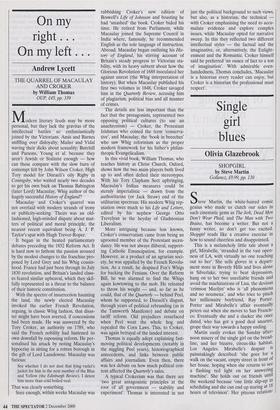On my right . . .
On my left . . .
Andrew Lyeett
THE QUARREL OF MACAULAY AND CROKER by William Thomas
OUP, £45, pp. 339
Modern literary feuds may be more personal, but they lack the gravitas of the intellectual battles so enthusiastically joined by the Victorians Amis and Barnes sniffling over disloyalty; Mailer and Vidal waving their dicks about sexuality; Burchill and Parsons, Young et al. because they aren't Jewish or Stalinist enough — how can these compare with the slow burn of contempt felt by John Wilson Croker, High Tory model for Disraeli's oily Rigby in Coningsby, who waited nearly two decades to get his own back on Thomas Babington (later Lord) Macaulay, Whig author of the hugely successful History of England?
Macaulay and Croker's quarrel was not overlaid with modern strands of irony or publicity-seeking. Theirs was an old- fashioned, high-minded dispute about mat- ters of political and moral principle, the nearest recent equivalent being A. J. P. Taylor's spat with Hugh Trevor-Roper.
It began in the heated parliamentary debates preceding the 1832 Reform Act. It is hard now to fathom the passion aroused by the modest changes to the franchise pro- posed by Lord Grey and his Whig cousin- hood. France had just been through its July 1830 revolution, and Britain's landed class- es feared similar upheaval, which they skil- fully represented as a threat to the balance of their historic constitution.
With the spectre of insurrection haunting the land, the newly elected Macaulay invoked the earlier French Revolution, arguing, in classic Whig fashion, that disas- ter might have been averted, if concessions had been made. He was answered by the Tory Croker, an authority on 1789, who said the French nobility had hastened its own downfall by espousing reform. He per- sonalised his attack by noting Macaulay's hypocrisy in sitting for a rotten borough in the gift of Lord Lansdowne. Macaulay was furious: See whether I do not dust that lying varlet's jacket for him in the next number of the Blue and Yellow (the Edinburgh Review). I detest him more than cold boiled veal.
That was clearly something.
Sure enough, within weeks Macaulay was rubbishing Croker's new edition of Boswell's Life of Johnson and boasting he had 'smashed' the book. Croker bided his time. He retired from Parliament, while Macaulay joined the Supreme Council in India where, famously, he recommended English as the sole language of instruction. Abroad, Macaulay began outlining his His- tory of England, his stirring account of Britain's steady progress to Victorian sta- bility, with its heavy subtext about how the Glorious Revolution of 1688 inoculated her against unrest (the Whig interpretation of history). But when Macaulay published his first two volumes in 1848, Croker savaged him in the Quarterly Review, accusing him of plagiarism, political bias and all manner of crimes.
The details are less important than the fact that the protagonists, represented two opposing political cultures (to use an anachronism) — Croker, the Protestant Irishman who coined the term 'conserva- tive', and Macaulay, the 'book in breeches' who saw Whig reformism as the proper modern framework for his father's philan- thropic Evangelicalism.
In this vivid book, William Thomas, who teaches history at Christ Church, Oxford, shows how the two main players both lived up to and often defied their stereotypes. With his Tory Clapham Sect upbringing, Macaulay's Indian measures could be sternly imperialistic — drawn from the authoritarian (or Jack Straw) end of the utilitarian spectrum. His modern Whig rep- utation owes much to his Life and Letters, edited by his nephew George Otto Trevelyan in the heyday of Gladstonian Liberalism.
More intriguing because less known, Croker's conservatism came from being an uprooted member of the Protestant ascen- dancy. He was not always illiberal, support- ing Catholic Emancipation, for example. However, as a product of an agrarian soci- ety, he was appalled by the French Revolu- tion. As a result, he despised Fox's Whigs for backing the Fenian& Over the Reform Bill, he was alarmed to find the Whigs again kowtowing to the mob. He relented to throw his weight — and, so far as he could, that of the Quarterly — behind Peel, whom he supported, to Disraeli's disgust, through years of political rebranding (as in the Tamworth Manifesto) and debate on tariff reform. Old prejudices resurfaced when Peel went the whole hog and repealed the Corn Laws. This, to Croker, was again betrayal of the landed interest.
Thomas is equally adept explaining fast- moving political developments (notably in the niggling Peel years), historiographical antecedents, and links between public affairs and journalism. Even then, there was hot debate on how much political con- tent affected the Quarterly's sales.
A typical Crokerism was that there are 'two great antagonistic principles at the root of all government — stability and experiment'. Thomas is interested in not just the political background to such views, but also, as a historian, the technical — with Croker emphasising the need to accu- mulate evidence and explore complex issues, while Macaulay opted for narrative sweep. In this they reflected two different intellectual styles — the factual and the imaginative, or, alternatively, the Enlight- enment and the Romantic. Croker himself said he preferred 'an ounce of fact to a ton of imagination'. With admirable even- handedness, Thomas concludes, 'Macaulay is a historian every reader can enjoy, but Croker is a historian the professional must respect'.


















































































 Previous page
Previous page